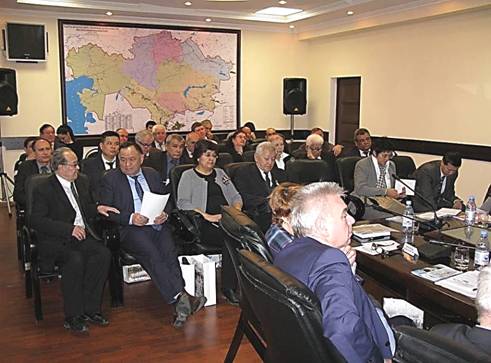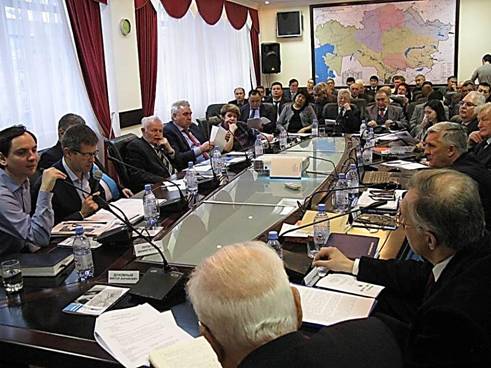INTERNATIONAL CONFERENCE OF THE EASTERN EUROPE, CAUCASUS AND CENTRAL ASIA NETWORK OF WATER MANAGEMENT ORGANIZATIONS “CULTURAL AND EDUCATIONAL ISSUES RELATED TO WATER MANAGEMENT IN THE EECCA COUNTRIES”
9-10 February 2016, Almaty, Republic of Kazakhstan
The key topics for discussion were:
- Water and culture;
- Water and civilization;
- Water and ethics;
- Water and education.
The Executive Secretary of EECCA NWO Prof. V.A. Dukhovniy opened the Conference.
The welcome speeches were delivered by:
- P.A.Polad-Zadeh, President, EECCA NWO (in form of a video message)
- D.P.Putyatin, Director, Department of Land Reclamation, Ministry of Agriculture, Russian Federation
- B. Libert, Regional Advisor for Environment, UNECE
- A. Chevelev, Officer-in-Charge of UNESCO Almaty Cluster Office
- E.Tardieu, Deputy Secretary General of International Network of Basin Organizations
Further, the following reports were presented:
Prof. V.A.Dukhovniy - Water and ethics in the modern world
B.Libert - International conventions as a display of water ethics
E.Tardieu - COP21 and INBO initiative “Paris Pact on water and adaptation to climate change
in the basins of rivers, lakes and aquifers”
V.I.Sokolov - Moral and ethical aspects of the society commitment to water security
A.D.Ryabtsev - Regional water strategy at present stage of water development in the Aral Sea Basin
Prof. N.B. Prokhorova - The role of Water Museum in educational and cultural space
Acad. B.M.Kizyaev - Environmental and social aspects related to water use in the Russia’s regions
Prof. V.A.Stashuk - Water resources in Ukraine: history and present-day
N.Kim – UNESCO-IHP activities: from global to regional perspectives
Prof. D.V.Kozlov - Innovative system of water education in the era of ambitious education and science reforms in Russia
O.I.Eshtchanov - Monitoring results of ASBP-3: water management actions to the benefit of EECCA
Ye. Simonov - New Silk Road – risks and opportunities for water sector
Prof. M.Yu.Kalinin - Experience in developing curricula for the postgraduate course on integrated water resources management as part of the EU Tempus Program
N.P. Mamataliev - Adoption of Integrated Water Resources Management in curricula of the Kyrgyz National Agricultural University named by K.I.Skryabin
M.Ya.Makhramov - Water and civilization
A.R.Uktamov - Construction of interstate main canals in the Syrdarya river basin and their current conditions
A. Tairov - About activity of the Intersectoral Work Team on hydrological risks
D.Dadobayev - Education for integrated water management and improved water use in the Republic of Tajikistan


Finally, the Conference adopted the resolution.
RESOLUTION OF THE INTERNATIONAL CONFERENCE
“CULTURAL AND EDUCATIONAL ISSUES RELATED TO WATER MANAGEMENT IN THE EECCA COUNTRIES”
The participants of the International Conference “Cultural and Educational Issues Related to Water Management in the EECCA Countries” met in Almaty on the 9th of February 2016 within the framework of the Network of Water-Management Organizations from Eastern Europe, Caucasus, and Central Asia (EECCA), have discussed urgent cultural and educational issues on the four key topics:
- Water and culture;
- Water and civilization;
- Water and ethics;
- Water and education.
The participants have agreed that:
- Water is a common social and natural resource, which first must be used for meeting drinking and household needs, nutrition and food production (irrigated agriculture), energy needs, for ensuring health, diet, livelihoods and well-being of population, especially of vulnerable people, for meeting environmental demand, and conserving and developing flora and fauna.
- Water should serve the purpose of mutually beneficial cooperation and by no means should become a cause of conflict. Any meeting of interest related to quantity and quality of water between interested sides should be decided on the base of mutual respect. The principles of international water law should be followed.
- Water is the nature’s gift, without which no life is possible on the Earth. Everyone has the right to life and, hence, to natural water. Therefore, in no circumstance, water in the open natural water bodies (oceans, seas, lakes, and rivers) can be considered as a commodity, although it has the economic value.
- Equitable and reasonable access to water for each is an ethic, moral, and legal right guaranteed by the State in quantity, which meets the physical standards and the most advanced technologies.
- Each user must practice water saving by avoiding its wastage, protecting quality of water in the sources from pollution and deterioration, timely covering costs related to water production and conveyance in the pipeline network.
While underlining that maintenance of professional community, information exchange and dissemination of best practices through EECCA NWO is of high importance, the participants made mention of the Network work progress in 2015, including:
- issue of Network’s information collections and scientific publications (www.eecca-water.net),
- extension of the knowledge base on CAWater-Info portal (www.cawater-info.net/bk/rubricator.htm) as part of the system of uniform tools for implementation of IWRM that are adapted to specific conditions of water management in river basins with different water stresses in arid and semi-arid zones of EECCA countries,
- participation of EECCA NWO members in international events, including in the 13th “EUROPE-INBO 2015” International Conference on the Water Framework Directive Implementation (Thessaloniki, Greece), the 9th International Conference “The Rivers of Siberia and the Far East” (Irkutsk, Russia), the 66th Meeting of the ICID International Executive Council and the 26th European Regional Conference “Innovate to Improve Irrigation Performance” (Montpellier, France), and the 7th Meeting of the Parties of the Convention on the Protection and Use of Transboundary Watercourses and International Lakes (Budapest, Hungary).
The participants believed it necessary to make deeper efforts for:
- implementation of the long-term Program aimed at equitable distribution of transboundary water, efficient use of freshwater in economic and social sectors, control of water pollution, and this should become a state duty from ethical and humanistic perspectives and the civil duty of every water user; enhanced exchange of information focused on dissemination of knowledge and best practices accumulated in the EECCA countries;
- training in the key areas contributing to improved water management (IWRM, water use technologies, information-communication systems (ICS), international water law, water diplomacy) in form of both conventional training courses and e-learning;
- development of (regional and national) knowledge hubs for assistance to water users at various hierarchical levels;
- promotion of ethically underpinned management and use of water resources;
- upbringing of future “water leaders” among young professionals (primary focus);
- promotion of Youth Water Parliament;
- involvement of basin organizations in the Network’s activity.
In context of the mentioned above, the participants thought it necessary to deepen activity of the Network by:
- Keeping submitting on regular basis the information on national events in the area of water management and information on new publications, software, methodologies and training materials in order to raise awareness among water professionals and encourage water sector development in EECCA.
- Enhancing cooperation with national focal points of international networks and organizations, such as Global Water Partnership (GWP), International Commission on Irrigation and Drainage (ICID) and others.
The participants proposed to organize the next Network’s conference in 2017 on the theme “River basin management problems in context of climate change”, including:
- transboundary river basin cooperation,
- sustainable water management and implementation of information-communication technologies (ICT) at basin level,
- adaptation of water management to climate change and anthropogenic impact,
- water-food-hydropower-environment nexus,
- SMART technologies in the water sector,
- water supply and sanitation.
Finally, the participants thanked UNECE and GWP CACENA for support and assistance provided to the Network, including in organization of this Conference. The participants thanked the Russian Government for the long standing support of EECCA NWO.
The participants also appreciated very much the assistance rendered by the Kazgiprovodkhoz Institute in preparation and organization of the Conference.
Full report (pdf, 1,1 MB)
|